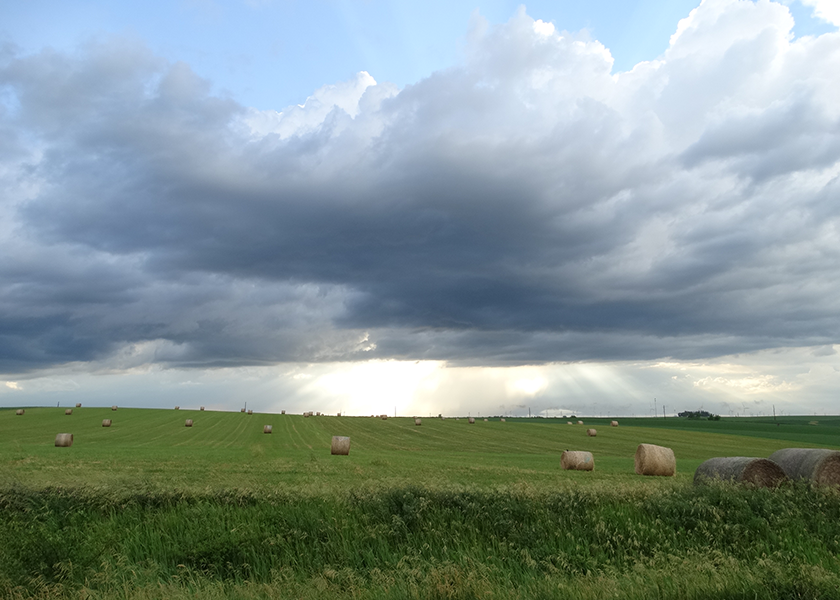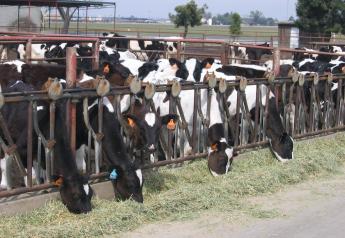Evening Report | March 5, 2024

Check our advice monitor on ProFarmer.com for updates to our marketing plan.
Significant drop in U.S. soyoil carbon footprint... A recent Life Cycle Assessment conducted by Sustainable Solutions Corporation (SSC) for the United Soybean Board (USB) and the National Oilseed Processors Association (NOPA) reveals a significant 22% reduction in the carbon footprint associated with U.S. soybean oil production from 2015 to 2021. This decrease is attributed to improvements in cultivation, harvesting, transportation and processing stages of soy production. The findings are particularly relevant as soybean oil serves as a crucial feedstock for biodiesel, renewable diesel and sustainable aviation fuel (SAF) production in the United States.
Soybean production and oil processing contribute over 40% of the carbon intensity (CI) score for soy-based biodiesel. The documented improvements are expected to result in reduced CI across the clean fuels industry. Clean Fuels Alliance America facilitated the alignment of collected data with specifications for the GREET model, ensuring seamless integration for model updates by Argonne National Laboratory.
Veronica Bradley, Environmental Scientist at Clean Fuels Alliance America, expressed anticipation for the GREET model updates to reflect the latest industry improvements, underscoring the collaborative effort towards enhancing sustainability in the clean fuels sector.
WTO backs EU in deforestation case... The European Union scored a victory at the World Trade Organization (WTO) as an adjudicating panel rejected a Malaysian complaint against an EU decision that biodiesel made from palm oil should cease to count as a renewable biofuel. In WTO’s first ruling related to deforestation, a three-person panel voted by two-to-one to reject Malaysia’s claims, while accepting its complaints over how the measures had been prepared, published and administered.
The dispute centers on EU rules setting a target of 10% of transport fuels from renewable sources. Crop-based biofuels are considered renewable if they meet sustainability criteria. The EU excludes crops grown on deforested land or where there is a high risk they displaced food crops, which were then grown on cleared land. The EU determined that palm oil-based biofuel should be phased out as a renewable by 2030, while crops grown in the bloc, such as sunflower or rapeseed, did not need to be.
Malaysia and Indonesia challenged the EU. The WTO panel was the same for both cases and was expected to have also issued a joint ruling. However, Indonesia requested the suspension of the panel’s work on Monday. Parties to WTO disputes normally know panel results before publication.
Rice battling vegetable impostors... The U.S. rice industry has been combating the emergence of rice pretenders — vegetables processed into rice-like shapes. Robbie Trahan, chair of USA Rice’s Domestic Promotion Committee, emphasized that rice is a grain, not a shape, and urged clarity in labeling to prevent confusion.
Despite requesting a standard of identity (SOI) from the Food & Drug Administration, no action was taken, prompting USA Rice to reach out to manufacturers to label their products as “riced” instead of “rice.” While some companies complied, others did not, prompting USA Rice to address the issue further.
The group focused on a particular brand, RightRice, and petitioned to cancel its trademark registration, arguing the name was deceptive. In late November, the U.S. Patent & Trademark Office’s Trademark Trial and Appeal Board (TTAB) granted USA Rice’s petition, leading to the cancellation of the trademark registration. This decision requires Planting Hope Brands, the company behind RightRice, to adjust its packaging and marketing.
USA Rice emphasizes the importance of consumer clarity in making informed purchasing decisions and criticized the misuse of trademark registration to mislead consumers. Despite this victory, USA Rice believes there is room for both real rice and rice alternatives in the market, as long as consumers are not deceived.
Animal rights groups seek to end CAFOs in California... Animal rights groups have submitted 37,000 signatures to qualify a ballot measure in Sonoma County, California, alarming farmers statewide. The initiative, led by the Coalition to End Factory Farms, seeks to ban concentrated animal feeding operations. To qualify for the November ballot, they need 19,746 signatures. Supporters estimate that 50 to 60 agricultural operations in Sonoma County would be impacted, facing closure or significant operational changes. The local Farm Bureau warns of severe consequences for Sonoma and potentially other counties if similar efforts are pursued elsewhere.
Vilsack, FTC chair address nutrition and competition concerns in food industry... During a School Nutrition Association meeting in Washington, USDA Secretary Vilsack engaged with hundreds of school nutrition professionals regarding the USDA’s proposed rule aimed at reducing sodium and sugar in school meals. The School Nutrition Association opposes this rule, expressing concerns about decreased appeal and increased costs associated with implementing healthier meals.
During a question-and-answer session, Jeanne Reilly, a Maine nutrition professional, questioned the necessity of changing guidelines that were successful in reducing childhood obesity. She suggested focusing on children's mental health and physical activity instead. Her sentiment received enthusiastic support from the audience.
Nichole Taylor, director of food services in Pennsylvania’s Chichester School District, emphasized concerns about reduced sugar requirements, particularly in maintaining students’ interest in school meals compared to sugary products available at home.
Vilsack defended the proposed changes, emphasizing their potential to combat childhood obesity and prevent future health issues. However, he acknowledged the stress faced by school meal professionals and emphasized the importance of a gradual transition and following scientific evidence.
Vilsack also discussed USDA efforts to address federal reimbursement rates for school meals and other related issues, including funding sources amid rising food and labor costs.
Separately, Federal Trade Commission (FTC) Chair Khan addressed market access and competition concerns, particularly in the grocery industry. She highlighted FTC’s scrutiny of the proposed Kroger and Albertsons merger, aiming to prevent price increases and wage depression. Khan also mentioned FTC’s renewed focus on enforcing the Robinson-Patman Act to combat price discrimination, especially beneficial for smaller grocery stores competing with larger chains.
Additionally, Khan addressed the “right to repair” issue, expressing FTC’s commitment to act against practices that hinder competition and lead to waste by limiting consumers’ repair options.
Arizona Sen. Kyrsten Sinema, an independent, says she is not running for re-election…"I believe in my approach," Sinema said in a video posted to X. "But, it's not what America wants right now. I love Arizona and I am so proud of what we've delivered. Because I choose civility, understanding, listening, working together to get stuff done, I will leave the Senate at the end of this year." The race for the Senate in Arizona will now likely be between Kari Lake, a far-right conservative, and Rep. Ruben Gallego (D-Ariz.).
Arizona Sen. Kyrsten Sinema, an independent, says she is not running for re-election. "I believe in my approach," Sinema, a marathoner and triathlete said in a video posted to X. "But, it's not what America wants right now. I love Arizona and I am so proud of what we've delivered. Because I choose civility, understanding, listening, working together to get stuff done, I will leave the Senate at the end of this year."
Other comments: "Despite modernizing our infrastructure, ensuring clean water, delivering good jobs and safer communities, Americans still choose to retreat farther to their partisan corners," Sinema said. "These solutions are considered failures, either because they’re too much or not nearly enough."
The race for the Senate in Arizona will now likely be between Kari Lake, a far-right conservative, and Rep. Ruben Gallego (D-Ariz.). During her five years in office, she built a major campaign bank account pegged at $10.6 million on Dec. 31, 2023, but her quarterly fundraising was outpaced by Gallego and Lake. Sinema left the Democratic Party in 2022. She was the first Democrat to win a Senate seat in Arizona in 30 years (in 2018). She started out in politics affiliated with the Green Party before becoming a Democrat. She made her mark in several major legislative battles related to infrastructure, guns and same-sex marriage protections. She was most recently involved in bipartisan efforts to secure the southern U.S. border.
Impact: Some Democratic strategists said they believed her run could have hurt Gallego’s bid, empowering the Trump-endorsed Lake.
China still leader in shipments into Port of LA but market share declining... The Port of Los Angeles has experienced consistent year-over-year increases in import volume recently. However, its business with China is projected to decrease to approximately 45% of the total volume, down from over 50% in previous years, according to the executive director of the port, which is the busiest gateway for seaborne trade in the nation. Despite this decline, China remains the dominant market for the Port of Los Angeles, accounting for about half of its freight activity thus far this year.
Gene Seroka, speaking on Bloomberg TV, anticipates a further decrease in the port’s engagement with China over the next few years, potentially dropping into the mid-40s percentage-wise, while still maintaining a strong position as the top market. Additionally, Seroka noted a rising trend in shipments from Vietnam, Thailand, Indonesia and India, indicating a diversification of trade partners for the port.
USDA’s ERP payments steady, Phase 2 sees slight increase... USDA’s efforts to distribute final payments under Phase 1 of the Emergency Relief Program (ERP) have seemingly succeeded, with total ERP payments remaining relatively unchanged as of March 3. The total ERP payments stand at $8.63 billion, with Phase 1 payments remaining at $7.75 billion, consistent with the previous week. Phase 2 ERP payments rose from $883.1 million to $883.2 million the previous week.






